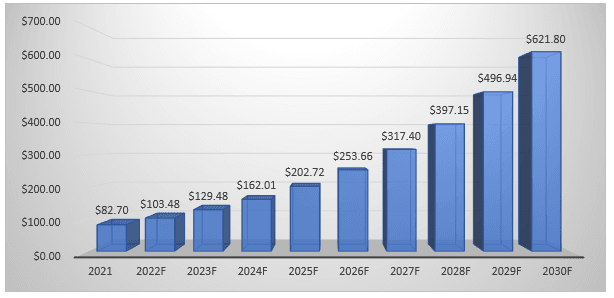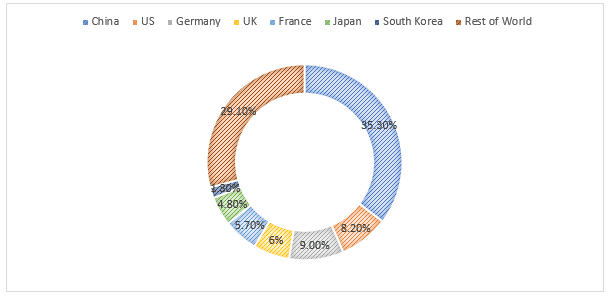Automotive IoT: Smarter Vehicles
Automotive IoT refers to a complex system of cloud-connected devices (sensors, cameras, GPS trackers, etc.) that provide real-time data to enable optimization of vehicle manufacturing processes and more efficient transportation management. IoT solutions turn vehicles into smart transportation vehicles. The vehicle leverages predictive maintenance, direct vehicle-to-vehicle interaction, AI-powered driver assistance, and other advanced features to improve road safety and driving efficiency for both individuals and businesses. Automakers are using IoT to automate production processes, reduce the potential for human error, and improve quality control.

AUTOMOTIVE IOT MARKET SIZE, 2021 TO 2030 [USD BILLION]
The global automotive IoT market size is estimated at US$82.7 billion in 2021 and is expected to exceed approximately US$621.8 billion by 2030. The global automotive IoT market is projected to grow at a compound annual growth rate (CAGR) of 25.13% during the forecast period from 2022 to 2030.
Benefits of using IoT in the automotive industry
Clear picture of the manufacturing floor :
Industrial IoT solutions can collect massive amounts of data on the production floor. By processing and analyzing such data in real time, automakers can better understand and optimize the entire production process, introduce higher safety standards and reduce losses.
Enhanced in-vehicle experience :
Users now have access to a range of features that make car ownership more convenient and efficient, including in-vehicle infotainment systems, navigation solutions, telematics and driver assistance systems.
Safer roads for drivers and pedestrians :
IoT-enabled safety systems such as object detection, pedestrian and lane detection, and automatic braking systems provide driving assistance to reduce human error and make vehicles safer for everyone.
Remote access to vehicle info :
Users can view relevant information about their vehicle, such as: For example, parking fuel levels and locations can be conveniently accessed remotely via a mobile app, saving time and enhancing the driving experience.
Improved car maintenance :
By analyzing data collected from IoT sensors installed in vehicles, it is possible to detect pre-failure conditions of vehicles, prompt users to take preventative measures to avoid malfunctions, and reduce vehicle maintenance costs.
Request For Sample – https://univdatos.com/get-a-free-sample-form-php/?product_id=25978
Fundamental drivers that support Automotive IoT
Fleet management & telematics IoT enhances fleet management with new advanced capabilities, making it more cost effective and reducing the need for manual operations. IoT devices integrated into vehicles collect real-time data on vehicle speed, location, payload, fuel consumption, driver behavior, and more. With the help of IoT analytics solutions, fleet management operators can gain insights from this data and automatically calculate the best method. They can monitor employee driving habits, check vehicle performance, and use predictive maintenance to avoid business disruptions.
Connected cars Integrated IoT sensors connect cars and enable vehicle-to-vehicle interaction (V2V). Cars can share relevant information such as location, route and speed. This feature helps prevent accidents and make roads safer. In an emergency, it can alert other drivers in the immediate vicinity to take precautionary measures or slow down. V2V connectivity also helps emergency vehicles navigate traffic.
Recent Developements
IoT-enabled in-vehicle infotainment systems provide services like music streaming, navigation, voice assistance, hands-free calling, etc. Volvo developed its Sensus Connect infotainment system with cloud-based services such as improved navigation with 3D maps, free map updates, an option to send destination instructions remotely, etc. to help connect their cars to the wider web and simplify car ownership.
DHL launched “DHL SmarTrucking solution.” The solution uses IoT sensors to collect real-time fleet data such as location, weather, and traffic for more efficient fleet planning and route optimization.

Exhibit 1: Global Connected Car Shipments (%) 286M Connected car additions by 2025
Read More Information – https://univdatos.com/report/automotive-iot-market/
Conclusion
The IoT in the automotive industry is having a major impact on the entire automotive concept, which is actively being reconsidered these days. People expect their cars to be full software platforms, easy to control and operate, with features like self-driving. Automakers can use IoT technology to improve manufacturing processes and create better vehicle systems. One of hottest topics is car maintenance. This contributes to economy, vehicle safety and in-vehicle infotainment, as driving today transforms drivers from stressful controls of the road to exhilarating journeys.
For more detail Contact:
UnivDatos Market Insights
C80B, Sector-8, Noida,
Uttar Pradesh 201301
For Sales related query, please reach us at [email protected]
